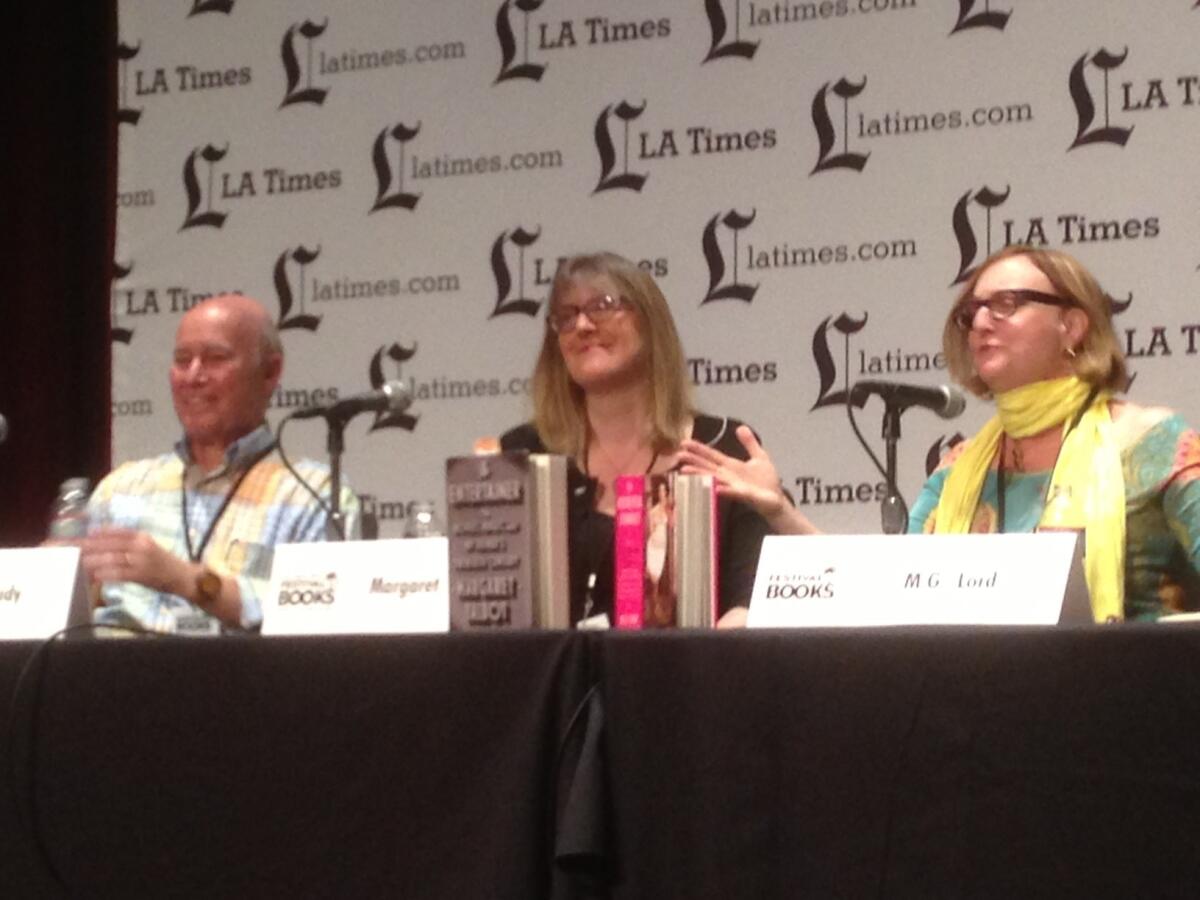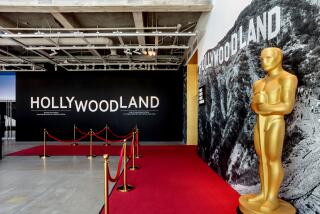Author panel puts Hollywood in the spotlight

- Share via
True to the occupations and personalities of its many inhabitants, Hollywood is constantly reinventing itself. In a Saturday panel at the Festival of Books moderated by Barbara Isenberg, authors Leo Braudy, M.G. Lord and Margaret Talbot discussed the chameleon-like evolution of Hollywood in the aptly titled “Telling Hollywood Tales.”
From its otherwise normal beginning as a cinema-less town to the tumultuous rise of what is universally regarded as the entertainment capital of the world, the name, the sign and the stars of the city continue to perplex.
For Talbot, author of “The Entertainer,” the name Hollywood is personal. Daughter of veteran actor Lyle Talbot, she recalled her childhood in Studio City, where dinnertime conversation was dominated by her father’s insider industry stories. Talbot’s realization of her father’s otherwise uncommon profession came “when he would drop lines about kissing Carole Lombard and I would see her in movies and think, ‘Wow! What an accomplishment!’”
FULL COVERAGE: FESTIVAL OF BOOKS
Leo Braudy, a cultural historian at USC, wrote “The Hollywood Sign: Fantasy and Reality of an American Icon,” a dissection of the Hollywood sign’s cultural significance. Braudy details the historical landmark’s timeline, from its inception as Hollywoodland, a sign advertising a real estate development to its transformation as the current symbol of Tinseltown that looks over the city of Los Angeles.
As L.A.’s reputation rose, so too did hostility between the business and film communities. The sign eventually (and accidentally) became an enduring symbol for Hollywood’s entertaining and scandalous side effects, such as the suicide of stage actress Peg Entwistle who jumped off the “H” in 1932.
What was often a tense standoff erupted in Hollywood Chamber of Commerce meetings in an effort to push movies below Santa Monica and to other parts of L.A. The hostility finally ceased in the 1920s. “The old Hollywood did not want a connection to the movie studio,” Braudy said.
Writer Lord details the power of Elizabeth Taylor’s acting in “The Accidental Feminist: How Elizabeth Taylor Raised Our Consciousness and We Were Too Distracted by Her Beauty to Notice.” Describing Taylor as possessing almost telepathic acting abilities in an era when much of reality was censored on screen, the actress later came to embody many of the characteristics of her sympathetic character Leslie Benedict in the film “Giant.”
INTERACTIVE: LITERARY L.A. MAP
Much as Leslie cared for the plight of minorities, Taylor raised awareness of the AIDS epidemic and the gay movement. “She always championed the underdog,” Lord said.
When asked by Isenberg how people think of Hollywood today, Talbot noted the personal connection many fans craved for, and ultimately achieved, during her father’s acting era. Fan clubs further served to unite members with their cherished celebrity. Today, the expectation no longer exists.
Lord noted how Elizabeth Taylor’s stardom was unparalleled, even by today’s standards. As a celebrity, Taylor was the omnipresent face dominating movie screens in an era when film prevailed over television.
As the panel shifted to questions, an audience member asked about today’s image of Hollywood and its significance in American society. Talbot pointed to the political implications of the town’s name. The city is known as “liberal Hollywood” (though originally it was a supportive Republican town).
Lord pondered the ability of new types of media -- cable programs over films -- to capture the art form, rather than the celebrity persona. “If it dilutes the famousness of the actors and makes them more actors than less stars, I think that’s also a good thing,” Lord said.
More to Read
Sign up for our Book Club newsletter
Get the latest news, events and more from the Los Angeles Times Book Club, and help us get L.A. reading and talking.
You may occasionally receive promotional content from the Los Angeles Times.








